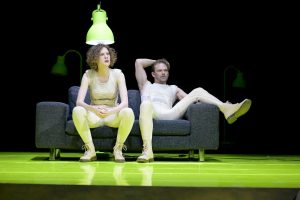With the rise of the #MeToo movement and angry white men who want to turn back the clock to the good old days of gender inequality, plays discussing the war of the sexes have been produced in theatres all over Germany. Nicolas Stemann, resident director at the Kammerspiele chose August Strindberg‘s first naturalistic play The Father to contribute to this discussion.

Courtesy of Thomas Aurin.
Premiering in Copenhagen in 1887, Strindberg’s play was a reaction to Henrik Ibsen’s A Doll’s House. Although at first a supporter of feminism, Strindberg changed his mind and with this play expressed his scepticism about a movement , which he considered too far-reaching in its demands.
The Father is a duel to the death between Adolf, a cavalry captain, and his wife Laura. Adolf is a typical patriarch who rules over his family. He controls the finances and is determined to decide the future of their daughter: Bertha will move to town to become a teacher. His wife wants Bertha to stay at home and become an artist. As Adolf completely ignores his wife’s wishes, Laura decides to get rid of her husband. She deprives Adolf of the books that he needs for his scientific research, tries to convince the local doctor that Adolf is losing his mind and drives her husband to madness by claiming that Bertha is not his child.
The play seems reactionary and dated at first glance, but considering the rise of reactionary movements denouncing gender equality and seeing men as the weak and disadvantaged sex, this play could not be more relevant. Recently, the misogynist movement Incel – men who claim to be involuntarily celibate because they are genetically disadvantaged, which is why women deny them sex – has been discussed in various newspaper articles, not solely because the man who killed 10 people by driving a van into a crowd in Toronto considered himself part of the “Incel Rebellion”.
Sitting on a sofa in a living room with shade lamps, an old TV and a lime green floor (stage design by Katrin Nottrodt), Julia Riedler and Daniel Lommatzsch recite the stage directions and narrate the first few scenes. They swap roles and jump back and forth between the different genders, sometimes speaking the lines as a chorus. Lommatzsch plays the captain as somewhat insecure and nervous whilst Riedler is a dominant and assertive Adolf. Important scenes are repeated several times to focus on the gender conflict, which feels a bit lengthy at times.
Nicolas Stemann‘s production is not naturalistic. He does not see actors and characters as a unity. Roles are assigned, they happen to people, and identities are constructed. It is made obvious to the audience that these characters are being played by actors. Stemann’s intention is to show how gender determines our roles and imprisons us in these roles: Adolf and Laura cannot reach a compromise because their roles force them to act the way they do.
Nicolas Stemann and his Dramaturg Benjamin von Blombergadded excerpts from Judith Butler’s works, Valerie Solanas’ “SCUM Manifesto” (1967) and “Anti-Oedipus” (1972) by Gilles Deleuze and Félix Guattari, in which they replace the term neurotic with schizophrenic, to Hans Egon Gerlach’s translation of Strindberg’s play. And schizophrenia abounds in this production: Benjamin Radjaipour and Zeynep Bozbay both play Bertha and overburden their father with books on feminist theory: “The tyranny of the biological family” and “maleness as a deficiency disease – trapped between human and ape“.
The male choir Camerata Vocale, looking like bearded hillbillies, accompany Adolf’s story about how he selflessly aided a mourning widow with sexist songs. Jutta Riedler, hiding behind a curtain, ends their macho performance with the help of a castration clamp. With every snip, one singer bends over like a puppet whose strings have been cut. Musicians Thomas Kürstner and Sebastian Vogel provide a melancholy score for Stemann’s production.
Towards the end, Riedler and Lommatzsch face each other behind a transparent curtain. Close ups of their faces are projected and merge into one face as Wiebke Puls takes over both roles. In a virtuoso performance, Puls plays both Adolf and Laura before putting on a straight jacket and stumbling onto insanity. The end of patriarchy is accompanied by male angst and hysteria.
An intriguing and challenging production that provides much food for thought. 4/5
Review written by Carolin Kopplin
DER VATER will return on 20th and 25th May 2018. For more info, click here…


Leave a Comment